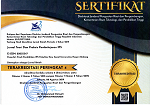Penanaman nilai dalam materi ajar pembelajaran daring perguruan tinggi
Abstract
Online learning offers cross-space and time, so students get flexibility in their time and place. Participants in online learning are larger than in traditional face-to-face classes. The utilization of internet networks has an impact on changes in learning culture. The position of students is required to be more individuals in managing learning. The role of the tutor revealed by Ki Hajar Dewantara has shifted its function. Educators cannot be directly involved in online learning. In online learning, educators function more than mediators and facilitators. Transfer of noble values, intellectualism, ethics, responsibility, honesty, and things that are reflective is not as easy as face-to-face learning. However, the application of technology in education is a necessity because the current generation is a digital generation whose daily life is inseparable from digital interactions. This study aims to see how the application of reflective aspects in learning material with a focus on the dominant material in the affective domain. Experiments will be conducted on learning video material on two groups of students. One group of students becomes a control group, while the other becomes an experimental group. In the control group, neutral learning videos will be used, while the experimental group will use features that apply the principle of coherence, personalization, and story method. The effectiveness of learning will be measured by evaluating the form of retention test, aptitude test, comprehensive transfer test, and problem-solving transfer test. This publication is ongoing research. It is expected that further discussions related to the methodology and features being tested can be raised. The application of technology that functions as an instrument of innovation in the cultivation of noble values of Indonesian culture is expected to be a reference in the design of teaching materials for online learning, especially for material from the affective domain.
Keywords
Full Text:
PDFReferences
Anna McKie. (2020). Hepi poll: most university students want exams to continue online. Tmies Higher Education Survey.
Cohen, J., 1998. Statistical power analysis for the behavioral sciences, Lawrence Erlbaum Associates.
Dewantara, Ki Hajar, 2013. Pemikiran, Konsepsi, Keteladanan, Sikap Merdeka. Pendidikan. Majelis Luhur Persatuan Tamansiswa. Penerbit Universitas Sarjanawiyata Tamansiswa.
Driyarkara, N., 1980. Tentang Pendidikan. Kanisius Yogyakarta.
Drost, J., 1999. Proses Pembelajaran sebagai Proses Pendidikan. Grasindo.
Guzman, R.D., 2007. Advanced methods in educational assessment and evaluation, Lorimar Publishing, Inc.
Kasilingam, G., Ramalingam, M., & Chinnavan, E., 2014. Assessment of learning domains to improve student’s learning in higher education, Journal of Young Pharmacists, 6, 27 – 33.
Kemenristekdikti Republik Indonesia. Klasterisasi Perguruan Tinggi Indonesia 2019, 2019. Diakses di: https://www.ristekdikti.go.id/kabar/menristekdikti-umumkan-klasterisasi-perguruan-tinggi-indonesia-2019-fokuskan-hasil-dari-perguruan-tinggi/
Kintsch, W., 1980. Learning from text, levels of comprehension, or: Why would anyone read a story anyway?, Poetics, 9, 87 – 98.
Krathwohl, D. R., Bloom, B. S., & Bertram, B. M., 1973. Taxonomy of Educational Objectives, the Classification of Educational Goals. Handbook II: Affective Domain. New York: David McKay Co., Inc.
Lowenthal, P. R., 2008. Online faculty development and storytelling: An unlikely solution to improving teacher quality. Journal of Online Learning and Teaching, 4(3).
Lowenthal, P. R. & Dunlap, J. C., 2009. From pixel on a screen to real person in your students' lives: Establishing social presence using digital storytelling. The Internet and Higher Education, Volume 13, Issues 1–2, January 2010, pp 70-72.
Mayer, R.E., 2009. Multimedia Learning. Cambridge University Press, New York.
Piliang, Y. A., 2017. Dunia yang berlari - Dromologi, Implosi, Fantasmoagoria. Aurora – CV Cantrik Pustaka, Yogyakarta.
Piliang, Y. A., 2019. Immediacy dalam Teknokultur. Makalah Extension Course Filsafat, Fakultas Filsafat Unpar dengan tema “Slow Sofia: Againts the Acceleration of Technoculture”.
Purnomo, A., Ratnawati, N., & Aristin, N. F. (2016). Pengembangan Pembelajaran Blended Learning Pada Generasi Z. Jurnal Teori Dan Praksis Pembelajaran IPS, 1(1), 70–76. https://doi.org/10.17977/um022v1i12016p070
Rex, L. A., Murnen, T., Hobbs, J., & McEachen, D., 2002. Teachers' pedagogical stories and the shaping of classroom participation: “The Dancer” and “Graveyard Shift at the 7–11”. American Education Research Journal, 39(3), 765−796.
Weiner, B., 1992. Motivation, dalam Alkin, M., ed, Encyclopedia of educational research, New York: Macmillan.
Wibowo, A. S., 2017. Paideia: Filsafat Pendidikan-Politik Platon. Penerbit Kanisius.
Refbacks
- There are currently no refbacks.
Editorial and Administration Office:
This Journal is published by Prodi Pendidikan IPS, Fakultas Ilmu Sosial, Universitas Negeri Malang
Semarang St. No. 5 Building I3-102 65145.
Phone. (0341) 551312. line. 376 (19)
Homepage: http://journal2.um.ac.id/index.php/jtppips/index
email: jtp2ips.journal@um.ac.id
JTP2IPS INDEXED BY:
e-ISSN 2503-5347
ISSN 2503-1201
JTP2IPS is licensed by CC BY 4.0.










